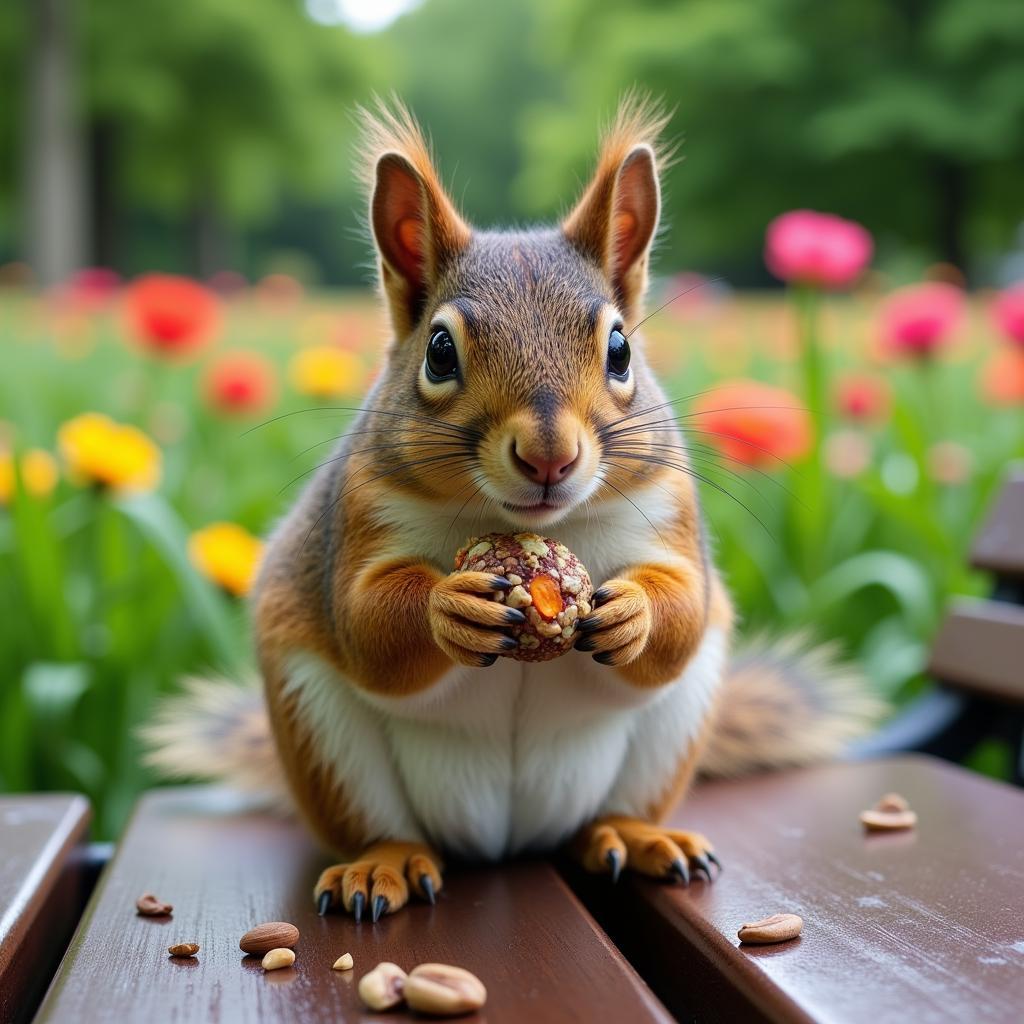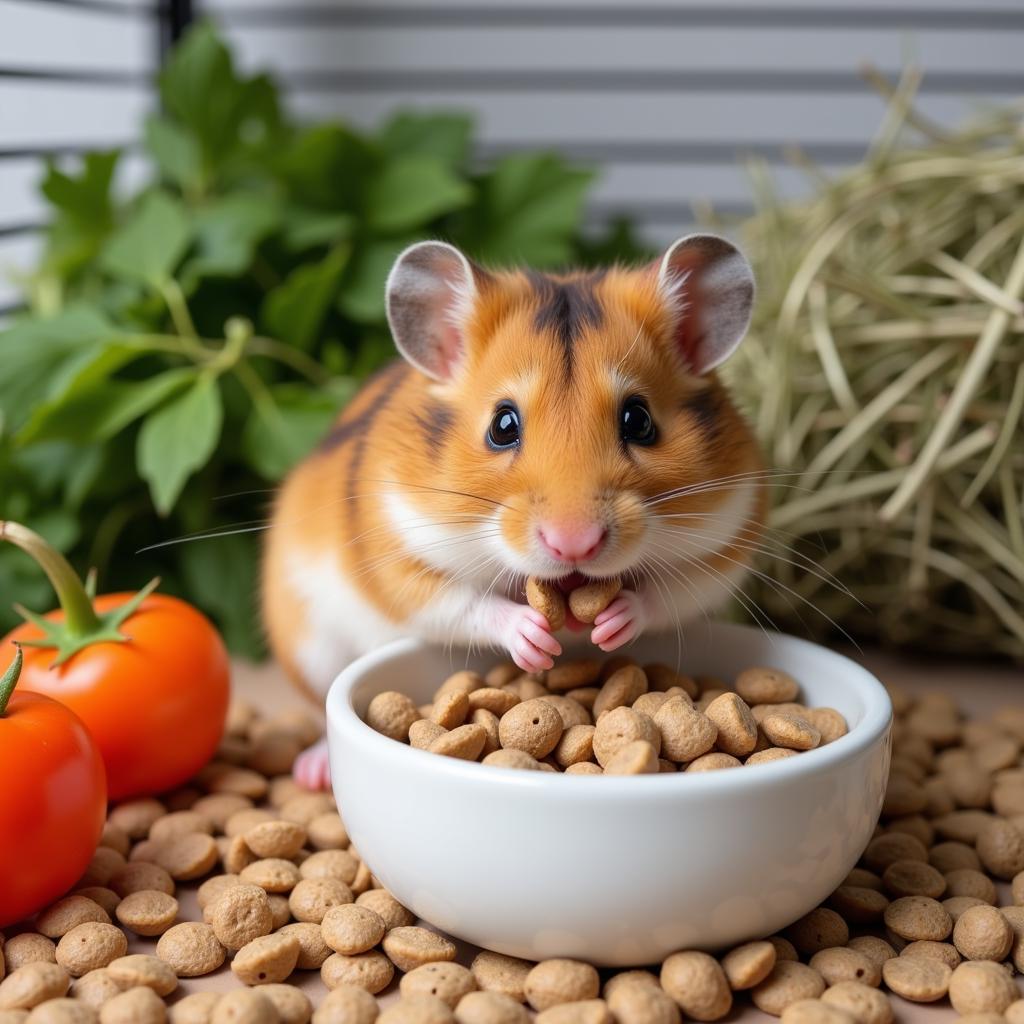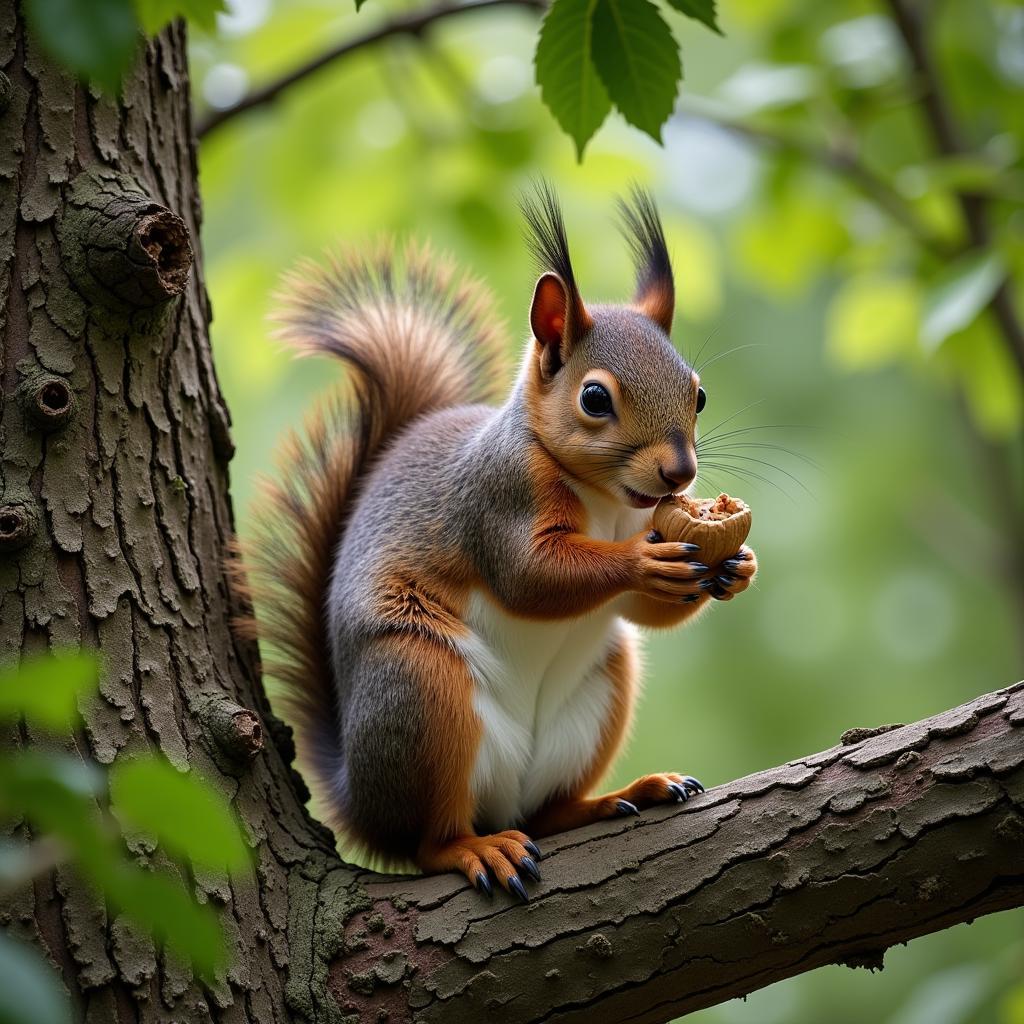You’ve likely seen squirrels dashing around, their cheek pouches stuffed with nuts and seeds. These agile creatures are notorious for their diverse diet, making you wonder, “Can Squirrels Eat Hamster Food?” The short answer is: it’s not ideal.
While a nibble here and there might not cause immediate harm, feeding squirrels hamster food regularly is not recommended. To understand why, let’s delve into the dietary needs of both animals.
Understanding a Squirrel’s Diet
Squirrels, belonging to the rodent family, are naturally opportunistic omnivores. Their diet primarily consists of:
- Nuts: Walnuts, acorns, hickory nuts, and pecans are staples.
- Seeds: Sunflower seeds, pumpkin seeds, and birdseed are favorites.
- Fruits: Berries, apples, and pears offer a sweet treat.
- Vegetables: Corn, broccoli, and leafy greens provide essential nutrients.
- Insects: Occasionally, they’ll munch on caterpillars, grasshoppers, and other insects.
 A squirrel enjoying a mix of nuts and seeds in a park setting
A squirrel enjoying a mix of nuts and seeds in a park setting
Their diet varies significantly depending on the season and availability of food. This natural foraging behavior ensures they receive a balanced intake of vitamins, minerals, and energy.
What About Hamsters?
Hamsters, also rodents, have a different dietary requirement. Their diet includes:
- Commercial Hamster Food: This forms the base of their diet and is specially formulated to meet their nutritional needs.
- Fresh Vegetables: Carrots, spinach, and zucchini are great choices.
- Fruits: Apples, bananas, and berries, in moderation, can be offered as treats.
- Timothy Hay: This provides essential fiber for digestion.
 A hamster eating from a bowl filled with commercial hamster food, fresh vegetables, and a side of timothy hay.
A hamster eating from a bowl filled with commercial hamster food, fresh vegetables, and a side of timothy hay.
Why Hamster Food Isn’t Suitable for Squirrels
While both animals are rodents, their nutritional requirements differ considerably.
- Nutritional Imbalance: Hamster food is fortified with specific vitamins and minerals that squirrels don’t necessarily need in the same quantities. Over time, this can lead to health issues.
- High in Fat: Hamster food generally contains a higher fat content than a squirrel’s natural diet. Excessive fat consumption can lead to obesity and other health complications in squirrels.
- Digestive Issues: Squirrels and hamsters have different digestive systems. The high starch content in hamster food can be difficult for squirrels to digest, leading to digestive upset.
What To Do If a Squirrel Eats Hamster Food
If a squirrel sneaks a bite or two of hamster food, don’t panic. It’s unlikely to cause any immediate harm. However, it’s crucial to prevent them from making it a habit. Here’s what you can do:
- Secure Your Hamster’s Food: Store your hamster’s food in airtight containers and ensure their cage is squirrel-proof.
- Offer Squirrel-Friendly Alternatives: Provide a variety of nuts, seeds, and fruits in your yard to entice squirrels away from your hamster’s food.
 A squirrel perched on a tree branch, enjoying a walnut.
A squirrel perched on a tree branch, enjoying a walnut.
Attracting Squirrels with the Right Food
Instead of hamster food, focus on providing squirrels with a healthy and natural diet. You can attract them to your backyard by offering:
- A Squirrel Feeder: Fill it with a mix of squirrel-friendly nuts and seeds.
- Fruit Trees: Planting fruit trees like apple, pear, or mulberry will provide a natural food source.
- Water Source: A birdbath or shallow dish with fresh water will attract squirrels, especially during warmer months.
Remember, it’s best to admire these creatures from a distance and allow them to thrive on their natural diet.
Conclusion
While it might be tempting to share your hamster’s food with a curious squirrel, it’s essential to remember that their dietary needs are different. Offering squirrels a healthy and natural diet not only keeps them happy and healthy but also allows you to enjoy observing these fascinating creatures in their natural element. If you have any concerns about a squirrel’s health or diet, it’s always best to contact a local wildlife rehabilitator or veterinarian for expert advice.
FAQs
1. What should I do if I see a sick or injured squirrel?
It’s best to contact your local wildlife rehabilitator or animal control. They have the expertise and resources to help the squirrel.
2. Can I keep a squirrel as a pet?
Squirrels are wild animals and require specialized care. It’s best to enjoy them in their natural habitat. In many areas, keeping squirrels as pets is illegal without a permit.
3. Do squirrels hibernate?
Squirrels don’t hibernate but may be less active during colder months. They rely on buried food caches to survive the winter.
4. Are squirrels dangerous?
While generally not aggressive, squirrels may bite if they feel threatened. It’s crucial to admire them from a distance and avoid hand-feeding.
5. How can I prevent squirrels from damaging my bird feeders?
Consider using squirrel-resistant feeders or placing feeders on tall, smooth poles that are difficult for squirrels to climb.
For any questions or concerns regarding pet care or wildlife, please feel free to contact us. Our dedicated team at Mina Cones Food is available 24/7 to assist you.
Phone: 02437655121
Email: [email protected]
Address: 3PGH+8R9, ĐT70A, thôn Trung, Bắc Từ Liêm, Hà Nội, Việt Nam.